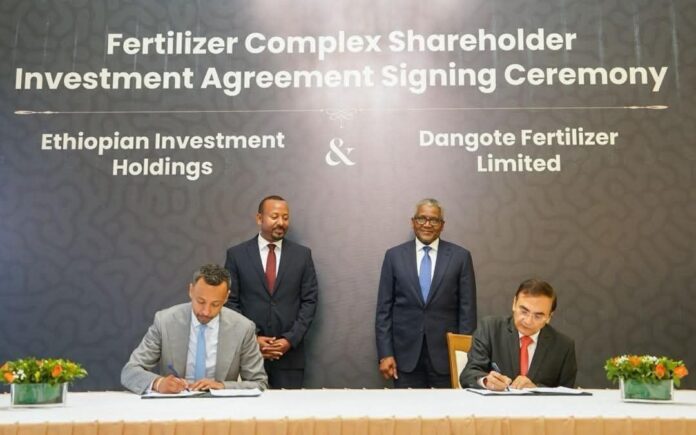As Dangote Group teams with Ethiopia Investment Holdings (EIH) to construct a state-of-the-art urea fertiliser facility in Gode, Ethiopia is poised to be a significant player in world fertilizer manufacturing. With a capacity of three million metric tons, the ambitious $2.5 billion project will be among the top five biggest urea-producing plants globally.
While Dangote Group has 60%, the partnership agreement gives EIH a 40% ownership share. Apart from the fertilizer facility, the initiative will also include vital infrastructure including pipelines to carry natural gas from Ethiopia’s Hilal and Calub reserves. Export facilities, logistics networks, and storage systems to service regional as well as local markets.
The News Chronicle understands that this partnership is more than merely a commercial expenditure. It shows Africa’s rising resolve to lessen dependence on foreign agricultural products and guarantee food systems for future. This project is a strategic masterstroke for agricultural development in the area given Dangote’s experience in supervising big projects and Ethiopia’s massive natural gas deposits.
The flexibility it offers for future growth into other ammonia-based fertilizers like calcium ammonium nitrate, ammonium sulfate, and ammonium nitrate is a major point of the agreement. This establishes Ethiopia not only as a self-sufficient producer of fertilizers but also as a possible regional exporter.
Aliko Dangote stressed that the site of Gode, together with Ethiopia’s natural resources, provides a perfect basis for regional food security. Leveraging Dangote Group’s years of experience in industrial projects, the 60/40 ownership split guarantees significant Ethiopian involvement.
Echoing this idea, CEO of EIH Dr. Brook Taye said the agreement was a watershed moment for Ethiopia’s industrial growth and agricultural development. Securing a major equity interest guarantees that the project fits the objectives of national development while also establishing Ethiopia as a regional fertilizer hub.
The fertilizer plant is projected to become a transformational project for Ethiopia, increasing production, generating employment, and helping Africa to become more independent in agriculture within 40 months.



